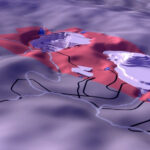6 pm
Welcome and introduction
Barbara Steiner, Director and Chairwoman of the Bauhaus Dessau Foundation and Vera Lauf, Research Associate
6:10 pm
The OSTEN Festival
// Impulse
Ludwig Haugk, Chairman of the Kulturpark e.V. association
The second edition of the Festival OSTEN focuses on environmental issues, among other things. Together with the people of Wolfen and Bitterfeld, the festival will visit places of the past and present to reflect on the future. One of the first environmental protests in the GDR will be commemorated: on 18 May 1984, a handful of young people met for a protest march that led from Bitterfeld via Greppin to Wolfen. They wanted to draw attention to the extent of the destruction. The festival reenacts the protest march together with local actors and international artists. How do we live in the ruins of chemical industrialisation today?
6:30 pm
Local participation
// Lecture
Samo Darian, Programme Director Aller.Land
The trombone choir in which both grandfather and grandson play, the community centre where cinema is shown at weekends – these are all important opportunities and places where people of different generations and backgrounds meet in everyday life, and which directly or indirectly encourage them to participate and get involved in society. However, in many places, there are fewer and fewer of them. This applies not only to the so-called transformation regions, but also, perhaps to a particular extent.
With examples from nine years of the TRAFO funding programme and the Aller.Land programme.
6:50 pm
Living memory
// Conversation
With Sven Sachenbacher on the importance of cultural institutions for socio-ecological change
The Wolfen Industrial and Film Museum and the Bitterfeld District Museum are lively places of learning, culture and remembrance that see themselves as identity-forming institutions. More than almost anywhere else, the tension between the great moments of technical and industrial progress and the serious consequences for people and the environment can be visualised here. The museums therefore look into the past, but also address questions of the present and future.
7:15 pm
Food
As always, you will be surprised with a culinary speciality.
8 pm
Resistant Communities
// Film presentation
Introduction: Marina Otero Verzier, architect and researcher
Films:
Grupo de Investigação Territorial, Montanha Invertida, 2022 (15:49 min)
Não às Minas, A film for Medios Libres con la Gira Zapatista, 2021 (9:12 min)
Lithium mining leaves deep scars both in the landscape and in the communities. Covas do Barroso in Portugal is an example of this destruction. This region, known for its rich biodiversity and centuries-old culture, is threatened with destruction by a planned mega-mine. The lithium deposit in Covas is considered one of the largest in Europe. Local residents are actively fighting back. They are campaigning to protect their social and environmental rights, which are being jeopardised in the search for a ‘green future’. Because the profits largely benefit others.
This resistance in Portugal is part of a broader movement that includes Argentina, Bolivia, Chile, the Czech Republic, the Democratic Republic of Congo, Spain and many other regions.
8:30 pm
The Poetic Act
// Participatory performance
Amereida-Ciudad Abierta group and the School of Architecture and Design in Valparaíso
The performance ‘The Poetic Act’ is part of the poetic tradition of the School of Architecture and Design in Valparaíso, Chile. The performance is a kind of collective game that refers to everyday experiences and gives them a new meaning. A poet from the school accompanies the process, while the participants perform spontaneous actions that are activated at the moment of the game – they are an expression of the present, ‘hic et nunc’.
At the school in Valparaíso, the poetic act opens up academic activities, for example, but it is also the prelude to creative projects that determine the conditions of human settlement of land.

